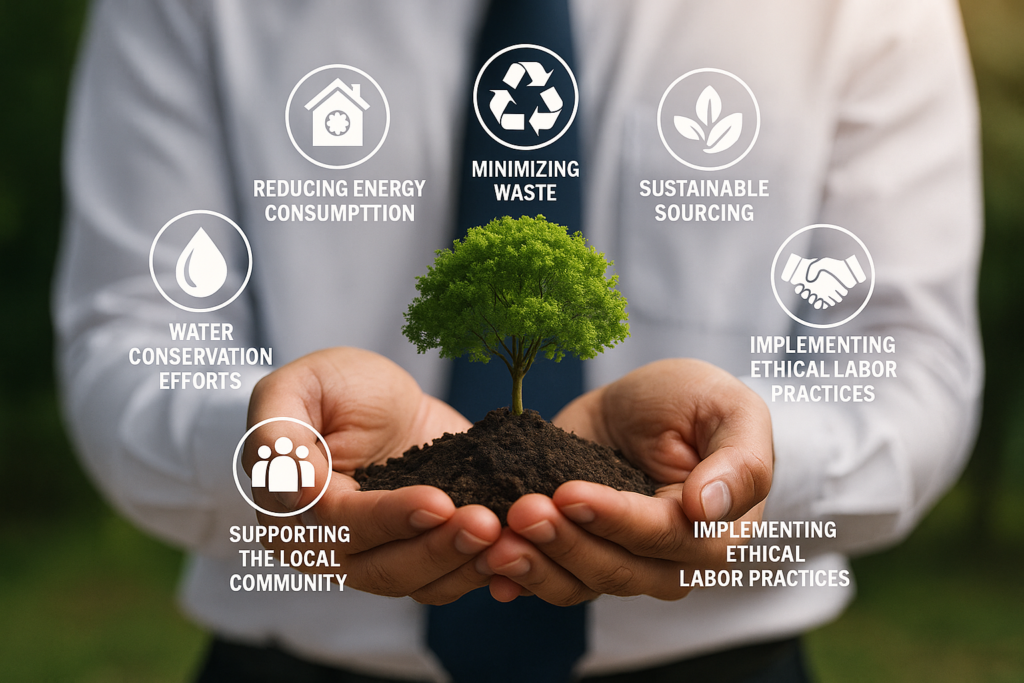Sustainability has become a vital component of modern business operations, especially as businesses strive to reduce their environmental impact, improve efficiency, and build stronger relationships with customers. In Australia, the increasing recognition of the importance of sustainable business practices has driven companies of all sizes to rethink their strategies.
From small cafés to large corporations, businesses are discovering that sustainability not only helps protect the environment but also boosts profitability, reduces costs, and enhances brand reputation.
Sustainable Business Practices:
A Key Focus for Owners
What Are Sustainable Business Practices?
Sustainable business practices refer to strategies and operations designed to reduce a company’s environmental impact, promote social responsibility, and support long-term economic viability. These practices include reducing waste, conserving resources, and making ethical business decisions that benefit both the company and the broader community.
According to the Australian Government Department of Industry, Science, Energy and Resources (2021), businesses are increasingly recognising that implementing sustainable practices results in improved efficiency and enhanced reputations with customers.
Sustainability is not solely about “going green”; it also includes considerations around ethical sourcing, fair labour practices, and community engagement. Businesses that embrace sustainability focus on making long-term decisions rather than prioritising short-term profits (Sustainable Business Australia, 2021).
Key Areas for Sustainable Practices
Sustainability can be integrated into several key areas of business operations.
Below are examples of common sustainable practices that businesses can adopt.
Reducing Energy Consumption
One of the easiest and most impactful ways for businesses to reduce their environmental footprint is by cutting down on energy usage. According to the Australian Department of Industry, Science, Energy and Resources (2021), businesses can reduce energy consumption by adopting energy-efficient technologies and practices.
These include:
- Switching to LED lighting: LED lights use significantly less energy than incandescent bulbs and last much longer, making them a simple and cost-effective way to reduce energy use (Department of Industry, Science, Energy and Resources, 2021).
- Using energy-efficient appliances: Investing in Energy Star-rated office equipment can lower both energy consumption and operating costs (Department of Industry, Science, Energy and Resources, 2021).
- Encouraging remote work: Allowing employees to work remotely or adopt hybrid work models can cut down on energy use in office spaces, reducing the need for heating, cooling, and lighting (Sustainable Business Australia, 2021).

Waste Reduction and Recycling
Waste reduction is another crucial element of sustainability. Businesses can minimise waste production and implement recycling systems by:
- Setting up recycling stations: Establishing separate bins for paper, plastic, and e-waste helps businesses streamline their recycling efforts (Environmental Protection Authority Australia, 2020).
- Going paperless: Transitioning to digital invoicing, contracts, and communications can reduce paper waste significantly, contributing to environmental sustainability (Environmental Protection Authority Australia, 2020).
- Using reusable office supplies: Replacing disposable office supplies with reusable alternatives, such as whiteboards instead of sticky notes, helps businesses reduce waste and increase sustainability.
Sustainable Sourcing and Supply Chains
Sustainable businesses ensure that their suppliers follow ethical and environmentally friendly practices.
This can include:
- Choosing suppliers with sustainable practices: Selecting vendors that use sustainable materials, such as recycled paper or eco-friendly packaging, helps businesses minimise their environmental impact (Sustainable Business Australia, 2021).
- Supporting fair trade: Sourcing products like fair-trade coffee, tea, or ethically produced goods helps ensure that workers are paid fairly and that environmental standards are met (Sustainable Business Australia, 2021).
- Reducing transportation-related emissions: By working with local suppliers, businesses can reduce the carbon emissions associated with the transportation of goods (Australian Conservation Foundation, 2021).
Water Conservation Efforts
Water is one of the world’s most valuable resources, and businesses can take steps to use it more efficiently.
Water conservation practices include:
- Installing water-efficient fixtures: Low-flow faucets and toilets help reduce water consumption without compromising on performance (Australian Conservation Foundation, 2021).
- Using rainwater collection systems: Collecting rainwater for irrigation or cleaning purposes is an effective way to reduce reliance on mains water (Australian Conservation Foundation, 2021).
- Educating employees: Encouraging employees to adopt water-saving habits, such as properly turning off taps, can contribute to overall water conservation efforts.
Ethical Labour Practices
Sustainability is not only about environmental impact; it also includes social responsibility. Ethical labour practices are integral to any sustainable business strategy.
Businesses can support ethical labour practices by:
- Providing fair wages and safe working conditions: Ensuring that employees are paid fairly and work in safe environments is a key aspect of ethical labour practices (Fair Work Commission, 2021).
- Supporting diversity and inclusion: Promoting diversity in hiring practices helps businesses create a more inclusive work environment, leading to better decision-making and productivity (Australian Human Rights Commission, 2021).
- Offering work-life balance: Providing flexible work arrangements helps employees maintain a healthy balance between their personal and professional lives, contributing to their overall well-being (Fair Work Commission, 2021).
Supporting the Local Community
Sustainable businesses also give back to the communities they serve. Common ways to support local communities include:
- Donating to local charities: Contributing to local causes or charities can help businesses strengthen their ties to the community (Sustainable Business Australia, 2021).
- Hosting community events: Organising or participating in community clean-up events or educational programs can raise awareness of environmental issues and help businesses engage with their local communities (Australian Conservation Foundation, 2021).
- Supporting local suppliers: By sourcing from local vendors, businesses contribute to the local economy and reduce transportation-related carbon emissions (Australian Conservation Foundation, 2021).
Carbon Footprint Reduction
A key focus for sustainable businesses is reducing their carbon footprint. Effective strategies for carbon reduction include:
- Offsetting emissions: Businesses can offset their carbon emissions by investing in renewable energy projects or planting trees (Carbon Trust, 2021).
- Encouraging sustainable transport: Providing incentives for employees to use public transport, carpool, or cycle to work reduces the overall carbon footprint (Carbon Trust, 2021).
- Switching to electric vehicles: By replacing petrol and diesel-powered vehicles with electric or hybrid alternatives, businesses can further reduce their carbon emissions (Carbon Trust, 2021).
Case Study: Green Leaf Café’s Sustainable Business Practices

Green Leaf Café, a small business in QLD, Australia, has successfully integrated sustainable practices into its daily operations.
The café’s owner, Tanya, was motivated by the rising costs of energy and waste disposal.
As part of her sustainability efforts, Tanya implemented several key initiatives:
- Energy Efficiency: The café switched to LED lighting and replaced older appliances with energy-efficient models. This resulted in a noticeable reduction in energy consumption and operating costs.
- Waste Reduction: The café introduced a composting system for food waste and began using biodegradable packaging for takeaway orders. Tanya also encouraged customers to bring their own reusable coffee cups.
- Sourcing Locally: By partnering with local farmers to source organic produce, the café supported the local economy and reduced its carbon footprint associated with transportation.
As a result of these changes, Green Leaf Café not only reduced its costs but also built a reputation as an eco-conscious business, attracting a loyal customer base that values sustainability.
Benefits of Sustainable Business Practices
Adopting sustainable practices provides several benefits for businesses.
These include:
- Cost Savings: Reducing energy consumption, cutting waste, and implementing water-saving measures can lower operational costs (Australian Government Department of Industry, Science, Energy and Resources, 2021).
- Improved Brand Reputation: Consumers are increasingly choosing businesses that demonstrate a commitment to sustainability (Sustainable Business Australia, 2021).
- Regulatory Compliance: Implementing sustainable practices helps businesses stay ahead of environmental regulations and avoid potential penalties (Environmental Protection Authority Australia, 2020).
- Long-Term Growth: Sustainable businesses are more adaptable to changing economic conditions and are better positioned for long-term growth (Sustainable Business Australia, 2021).
In summary…
Sustainability is no longer a luxury but a necessity for businesses of all sizes. By implementing practices that reduce waste, conserve resources, and prioritise ethical decisions, businesses can not only contribute to environmental protection but also improve their financial performance and reputation.
Whether it’s through energy efficiency, ethical labour practices, or carbon footprint reduction, every business has the opportunity to make a positive impact on both the planet and their bottom line.
Disclaimer For External Distribution Purposes
The information contained in this publication is for general information purposes only, professional advice should be obtained before acting on any information contained herein. The receiver of this document accepts that this publication may only be distributed for the purposes previously stipulated and agreed upon at subscription. Neither the publishers nor the distributors can accept any responsibility for loss occasioned to any person as a result of action taken or refrained from in consequence of the contents of this publication.
References:
- Department of Industry, Science, Energy and Resources. (2021). Energy efficiency in Australian businesses. Australian Government. https://www.energy.gov.au
- Australian Conservation Foundation. (2021). Water conservation and sustainable business practices. https://www.acf.org.au
- Fair Work Commission. (2021). Workplace diversity and fair pay. https://www.fwc.gov.au
- Sustainable Business Australia. (2021). Sustainability in small and medium businesses. https://www.sustainablebusiness.org.au
- Carbon Trust. (2021). Carbon footprint reduction strategies. https://www.carbontrust.com
- Environmental Protection Authority Australia. (2020). Best practices for business waste management. https://www.epa.gov.au

